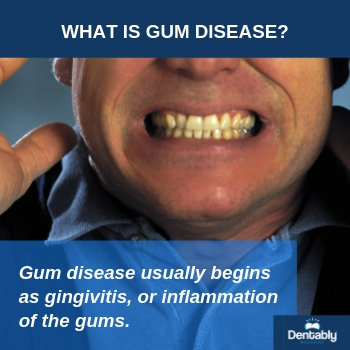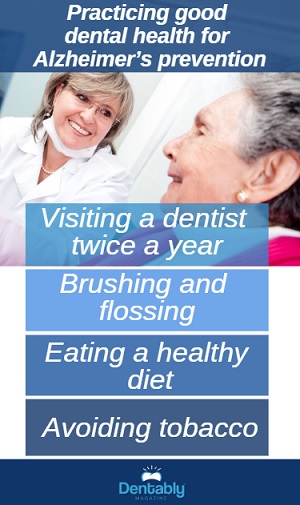Gum Disease & Alzheimer’s
Recent studies have shown that there is a possible connection between gum disease and Alzheimer’s. The bacteria in periodontitis can travel from the mouth to the brain causing neurons to be destroyed. It’s important to keep your gums and teeth healthy to avoid gum disease for your overall health and lower your chances of getting Alzheimer’s.
What is Gum Disease?
Gum disease is a common but preventable dental condition seen mostly in adults. Approximately half of American adults suffer from some form of gum disease. This common condition can become serious if left untreated. You may have gum disease if you are experiencing any swollen, red, and tender gums. Your gums may also bleed when brushing or flossing. Other symptoms may also include bad breath and frequent toothaches. If you suffer from severe periodontitis you are more susceptible to abscessed teeth as well.
Gum disease usually begins as gingivitis, or inflammation of the gums. If poor dental care continues, gingivitis can progress into periodontitis if not treated. Its primary cause is plaque buildup. If plaque is left to build up it can become mineralized it can turn into hard tartar. Tartar can only be removed by your dentist scraping it off. Visiting your dentist for a professional cleaning twice a year can help with plaque build up and fight gum disease. Also, having a good dental care routine at home that includes brushing and flossing daily can help prevent the condition.
Gum Disease and Alzheimer’s
With Alzheimer’s and Dementia being the fifth leading cause of death around the world, doctors and researchers have been hard at work to find the cause and slow or reverse the harsh progress and effects of this condition.
While more research needs to be done, there have been studies that show that gum disease may play a role in Alzheimer’s. Nearly 5 million Americans suffer from Alzheimer’s, most being over 60 years old. A bacteria present in gum disease, Porphyromonas gingivalis, can travel from the mouth to the brain. These bacteria secrete a toxic protein that can destroy brain neurons. As mentioned, more research needs to be done as it still is not clear if gum disease bacteria actually triggers Alzheimer’s. However, previous studies showed that people with chronic gum disease for 10 years or more had a 70 percent higher risk of Alzheimer’s than those without gum disease.
“There’s still a lot we don’t understand about the link between oral and systemic health. But it’s clear that the mouth influences general wellness, so maintaining excellent oral health is paramount to lowering the risk of many other diseases.”
Practicing good dental health for Alzheimer’s prevention
Good dental health is important to your overall health and will help you prevent gum disease. If you can prevent yourself from contracting gum disease, you may be able to lower your chances of getting Alzheimer’s. The best ways to practice good dental care are:
- Visiting a dentist twice a year
- Brushing and flossing
- Eating a healthy diet
- Avoiding tobacco
Your dentist is going to be able to clean your teeth better than anyone. It’s important to schedule routine visits once every six months. They can make sure that plaque is not building up on your teeth and if they notice signs of gum disease they can provide you with the treatment you may need.
Brushing your teeth twice a day is the best way for you to avoid plaque buildup at home. However, brushing too hard can get oral bacteria into your bloodstream, so be gentle. Flossing once a day right before bed is also a great way to remove any food or debris near your gums and avoid them from getting irritated.
Eating a diet that is rich in vitamins and nutrients is one of the key ways to keep your gums and teeth healthy. You’re going to want to eat an abundance of fruit and vegetables as they are the best sources of vitamins and nutrients. It’s important to avoid sodas, candy, juice, and other foods high in sugar. It’s okay to enjoy these in small amounts but overconsumption of sugar can cause cavity and tooth decay, leaving you more susceptible to gum disease.
Tobacco products not only put your life in danger, but the usage of tobacco products can also lead to gum disease. The chemicals cause cell damage and break down the connective tissues that keep your teeth in place. The more one consumes tobacco, the worse the effects can be. To keep your gums and teeth healthy it’s best to avoid tobacco altogether.
Frequently Asked Questions- Gum Disease & Alzheimer’s
What causes gum disease?
Gum disease is caused by severe plaque build-up in the mouth. This can happen from not properly caring for your teeth and gums or if you consume too much tobacco.
How can I prevent gum disease?
The best way to prevent gum disease is to visit your dentist twice a year. Also, brushing, flossing, and eating a nutrient-rich diet are good ways to prevent the disease. It’s best to avoid smoking and chewing tobacco to avoid contracting this disease as well.
How can Alzheimer’s be prevented, with gum disease being so common?
As mentioned, more research needs to be done to know if gum disease is what’s actually causing Alzheimer’s. There are a lot of other factors that could cause someone to contract Alzheimer’s and the condition still baffles experts on what causes is it and how to manage it. Maintaining good oral care and preventing gum disease is the best thing for you to do.
Medically Fact-Checked & Written by Our Dental Editorial Team
You can read more about our editorial guidelines by clicking this link and learn more about the Emergency Dentists USA editorial team here.






